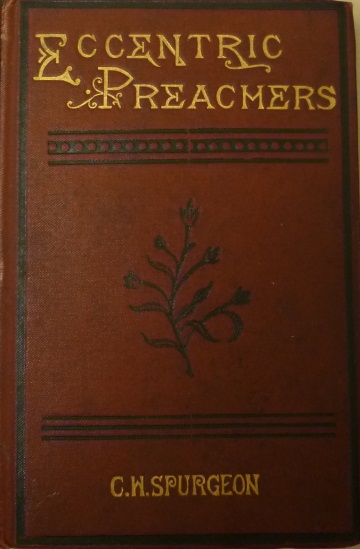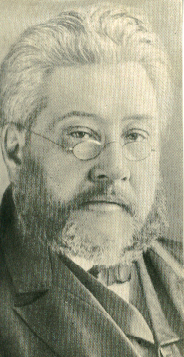Eccentric Preachers
Posted Monday, 3rd March 2014
Charles Spurgeon (1834-1892), the charismatic and prolific Baptist author, first published this petite volume in 1879. The Angus holds the 1888 edition, published as part of “Spurgeon’s Shilling Series” and only 12.5cm high.
Spurgeon does not see the charge of eccentricity as necessarily a negative one:
Now I am free to admit that the word has come to mean singular, odd, whimsical, and so forth; but by going a little deeper into its etymology, we discover that it simply means that the circle in which an eccentric man moves is not quite coincident with that which is followed by the majority: he does not tread the regular ring, but deviates more or less as he sees fit.
Indeed, Spurgeon has been regarded as an eccentric himself: he recounts, as one instance, a letter received from a Dutch minister, who had been shocked to the core to hear him preach. But what had Spurgeon done that was so distressing?
He said that I wore a moustache like a carnal, worldly-minded man!
Charles Spurgeon and his moustacheSpurgeon puts forward a passionate defence of a number of pastors whom he considers to have been unfairly charged with eccentricity, and in the process tells a number of curious tales.
On keeping off the rain:
Time was when it was accounted one of the outrageous deeds of a certain Jack Hanway, that he actually walked down a street in London on a rainy day, carrying a new-fangled kind of round tent to keep off the wet; yet no one quotes this action now as a proof of extreme eccentricity, for umbrellas are as common as mushrooms.
On backsliding:[1]
A man once went to Vincennes, in the United States, to hear Lorenzo Dow preach on backsliding. He said, ‘An immense concourse of people assembled in the woods, and waited for Dow’s arrival. Finally he made his appearance, and at the time all expected the sermon he arose, climbed up a smooth sapling, and cried out, ‘Hold on there, Dow; hold on.’ He soon slid down to the ground, and put on his hat and left. That was all the sermon we heard that day.
On William Dawson:
Dawson was once preaching about Noah’s ark, and finding himself boxed up in the pulpit he said, “This won’t do.” He opened the pulpit door and he came down the stairs to the bottom of the pulpit, and there he began to fell trees and cut and saw them, and then he seemed to be hammering away to make the ark, which was represented by the pulpit.
If God gave him the histrionic faculty, why should he not use it to impress his hearers?
And finally, advice for us all on British manners and speaking one’s mind:
A gentleman not long ago was set down as very eccentric because being asked whether the tea was to his taste, he replied that it was not, for it was very weak and nearly cold. Others had equivocated, or had expressed themselves delighted with the nauseous decoction, and none of these were set down as eccentric. The more’s the pity!
However, a word of warning from Spurgeon regarding newspaper (or, perhaps, blog) articles: “[they] make selections of all the remarkable anecdotes, or odd sayings, used by a speaker, and when these are separated from their surroundings the result is anything but satisfactory.”
So for those who desire full satisfaction, the text is located in the Angus collection, shelfmark 1/2/218.
By Lucy Kelsall, Cataloguer
[1] Spurgeon quotes from William Taylor, The Model Preacher.




Recent Comments